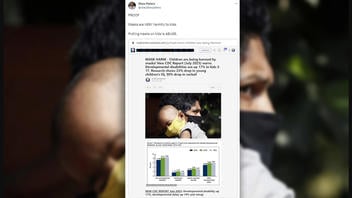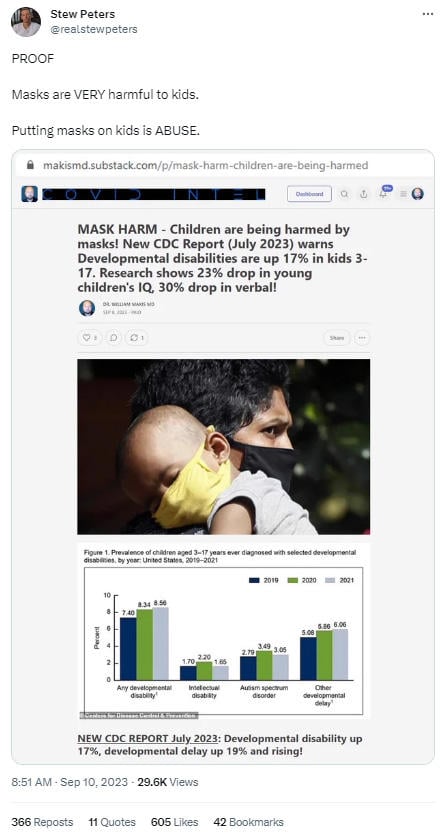Fact Check: CDC Report Does NOT Link Developmental Disabilities In Children With 2019-21 Pandemic Masking

Did a July 2023 report from the Centers for Disease Control and Prevention conclude that children are being harmed by masks, resulting in a 17 percent rise in developmental disabilities in children 3-17? No, that’s not true: A misleading headline on a paywalled Substack blog post mentions a “New CDC Report” as if it offers evidence supporting the claim that children are being harmed by masks — but the report does not mention masks at all. The report’s survey methods were redesigned from previous years due to the pandemic, so the report summary cautions that “these estimates may not be comparable with pre-redesign estimates.”
The Substack post (archived here) by Dr. William Makis, titled: “MASK HARM – Children are being harmed by masks! New CDC Report (July 2023) warns Developmental disabilities are up 17% in kids 3-17. Research shows 23% drop in young children’s IQ, 30% drop in verbal!” was published on September 8, 2023. The author promoted the post on X (formerly Twitter) the same day. A screenshot of Makis’ post (archived here) was posted by podcaster Stew Peters on September 10, 2023. This post was captioned:
PROOF
Masks are VERY harmful to kids.
Putting masks on kids is ABUSE.
This is what the post looked like on X at the time of writing:
(Source: X screenshot taken on Mon Sep 11 17:57:09 2023 UTC)
The scope of this fact check is not meta-analysis of the available research on the impact of masking on childhood development; it is to clarify what the CDC report says and does not say.
The headline by Makis does not expressly state that the Centers for Disease Control and Prevention (CDC) report found that masks caused developmental disabilities. The claim is broken up into two separate sentences that read as one continuous declaration: “Children are being harmed by masks!” and, “New CDC Report (July 2023) warns Developmental disabilities are up 17% in kids 3-17.” That Peters calls this “PROOF” suggests intent to mislead or indifference to misunderstanding.
In July 2023 the CDC published NCHS Data Brief No. 473 (pdf here) from the National Center for Health Statistics (NCHS). The eight-page document is titled, “Diagnosed Developmental Disabilities in Children Aged 3-17 Years: United States, 2019-2021.” It’s the result of a survey conducted on a continual basis with a group of unchanging core questions plus questions that may vary from year to year (Sample Child Questionnaire.pdf). The questions are answered by a parent or guardian in the home, but during the COVID-19 pandemic many interviews were conducted by telephone. In 2019 the questionnaire was redesigned. The data brief highlights four key findings from the National Health Interview Survey:
During 2019-2021, the prevalence of any diagnosed developmental disability in children aged 3-17 years increased from 7.40% to 8.56%.
The prevalence of any developmental disability was lowest in non-Hispanic Asian children compared with other race and Hispanic-origin groups.
The prevalence of intellectual disability increased with age, while the prevalence of other developmental delay decreased with age.
Boys (4.66%) were more than three times as likely as girls (1.50%) to be diagnosed with autism spectrum disorder.
A document search (Ctrl/Cmd+F) in the data brief for the word mask or masking finds no results. There is no mention of masking in this report, and there is no way to derive conclusions on the role masking may have played in the findings. The survey asked the parents if a doctor or health professional had diagnosed the child with autism spectrum disorder, an intellectual disability, or another developmental delay. The children were not participants in a study.
The headline from Makis’ blog claims the “New CDC Report (July 2023) warns Developmental disabilities are up 17% in kids 3-17.” The data brief doesn’t really warn, it simply reports the findings. The data brief also does not ever use the statistic “up 17%.” In the key findings, the data is communicated this way:
During 2019-2021, the prevalence of any diagnosed developmental disability in children aged 3-17 years increased from 7.40% to 8.56%.
The absolute change in diagnosed developmental disability during 2019-21 was 1.16 percentage points, for the roughly 17 percent relative change stated by Makis.
In the summary of the data brief, the authors make note of the redesign of the survey, which may make the new data difficult to compare to past reports.
Estimates presented in this report are the first on developmental disabilities from NHIS since the survey was redesigned in 2019. While the prevalence reported in this report was higher for each selected condition than in a previous report from NHIS with estimates from 2014-2016, these estimates may not be comparable with pre-redesign estimates.
The final sentence of Makis’ headline reads:
Research shows 23% drop in young children’s IQ, 30% drop in verbal!
These statistics were not derived from the CDC report, but a preprint that was published in medRxiv on August 16, 2022. This preprint titled, “The COVID-19 Pandemic and Early Child Cognitive Development: A Comparison of Development in Children Born During the Pandemic and Historical References” has not been peer reviewed. This study does mention the word mask nine times in its text but does not conclude that the cognitive performance was caused by masking. It says:
Conclusions: Results reveal a striking decline in cognitive performance since the onset of the COVID-19 pandemic with infants born since mid-2020 showing an average decrease of 27-37 points. Further work is merited to understand the underlying causative factors.
This article has been archived for your research. The original version from Lead Stories can be found here.


